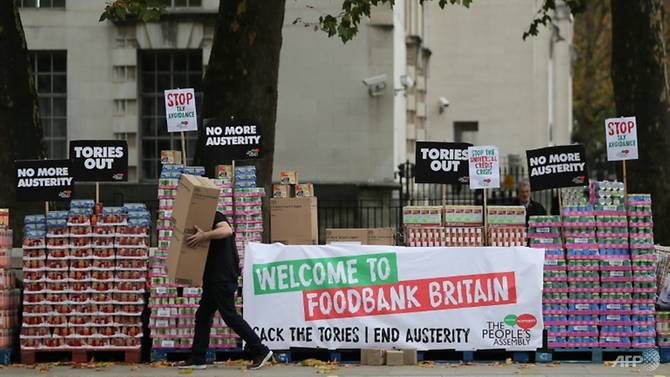Food bank protest staged outside British PM's office
 |
| Campaigners protest against government austerity programmes next to crates of tinned food destined for food banks outside Downing street. (AFP/Daniel LEAL-OLIVAS) |
The demonstration by the People's Assembly Against Austerity group saw crates carrying tonnes of tins, milk cartons and fruit juices piled up on the street as campaigners urged the public to donate.
"The rich in this country are getting richer, and the poor are getting poorer and poorer all the time," Tom Griffiths, one of the organisers, told AFP.
"What we would like them to see is that austerity isn't working. They are talking about a strong economy but it's a strong economy for a very small privileged few," Griffiths said.
According to the Trussell Trust, which manages the vast majority of food banks in Britain, some 1.2 million emergency food packages were distributed during the 2016/2017 financial.
That was 29 times higher than in the 2009/2010 financial year just before budget austerity was imposed by then new prime minister David Cameron.
Faiza Shaheen, head of the Centre for Labour and Social Studies, said at the protest: "People are struggling.
"The levels of personal debt, in terms of household debt, are back to pre-financial crisis level, and that's what triggered the crisis in the first place. This is unsustainable, socially and economically."
Since coming to power in 2016 following the Brexit referendum, May has continued with austerity policies with the aim of reducing the deficit to below 2.0 per cent of gross domestic product.
The unemployment rate of 4.3 per cent is currently at its lowest since 1975 but household purchasing power has been reduced because of higher inflation.
A group of economists, including Nobel-winner Joseph Stiglitz, has appealed to Finance Minister Philip Hammond to announce an end to austerity when he reads out his budget in parliament on Wednesday.
"We've reached a dangerous tipping point. Austerity has failed the British people and the British economy. We demand the chancellor ends austerity now," they said in an open letter to the Guardian on Tuesday.
What the stars mean:
★ Poor ★ ★ Promising ★★★ Good ★★★★ Very good ★★★★★ Exceptional
Latest News
More News
- Thailand tightens security following violent attacks in deep south (March 11, 2025 | 14:52)
- ASEAN states unite for future economic stability (March 06, 2025 | 10:41)
- Indonesia plans over 20 energy projects in 2025 (March 05, 2025 | 10:09)
- Bali to use “water taxi” to address traffic congestion (March 04, 2025 | 17:15)
- RoK, Thailand hold 4th round of economic partnership negotiations (March 04, 2025 | 16:48)
- Thailand busts illegal e-money firms (March 03, 2025 | 16:47)
- Thailand to repatriate thousands of scam centre workers from Myanmar (March 03, 2025 | 10:51)
- PM stresses need for ASEAN to embrace new technologies (February 26, 2025 | 17:30)
- The world's future belongs to the youth: PM (February 26, 2025 | 17:23)
- More than 200 foreigners rescued from Cambodian scam centre (February 25, 2025 | 16:06)



















 Mobile Version
Mobile Version